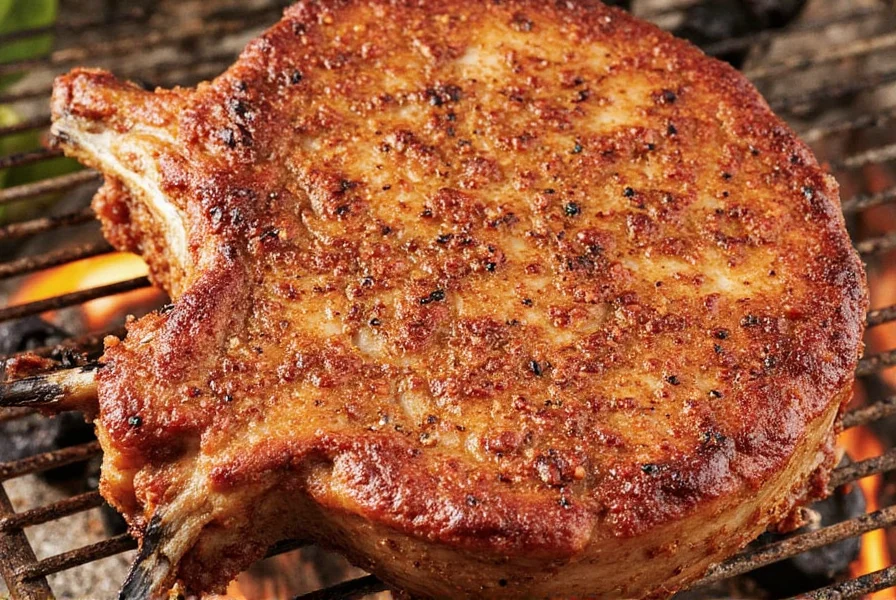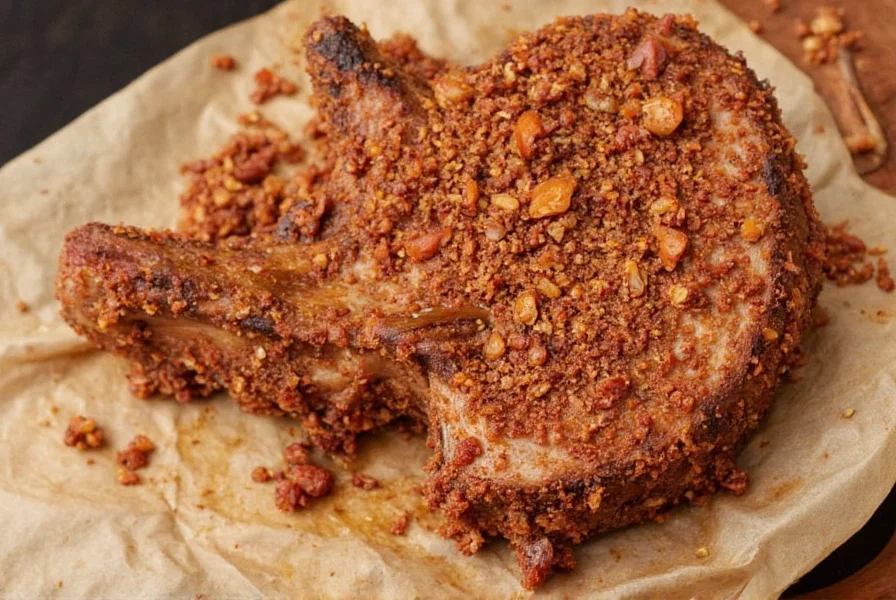Easy Pork Chop Rub Recipe for Juicy, Flavorful Chops
Get restaurant-quality pork chops every time with this simple, foolproof rub. No more dry or bland results—just juicy, flavorful meat with minimal effort. Here's the exact recipe and pro tips to nail it.
Classic Pork Chop Dry Rub (Makes ~¼ cup)
- 2 tbsp brown sugar
- 1 tbsp kosher salt
- 1 tbsp smoked paprika
- 1 tsp black pepper
- ½ tsp garlic powder
- ½ tsp onion powder
- ½ tsp ground mustard (optional for tanginess)
Pork Chop Rub Basics: What You Need to Know
Before we dive into the star recipe, let's talk about what makes a good rub tick:
- Salt – The backbone of any good seasoning. It pulls moisture from the surface of the meat and helps create that glorious crust.
- Sugar – Balances out savory notes and adds caramelization when grilled or roasted.
- Pepper – Adds heat and depth. Black pepper is classic, but smoked or white pepper can bring something unique to the table.
- Paprika – Offers color and mild sweetness. Smoked paprika adds a bold, earthy layer.
- Garlic & Onion Powder – Umami bombs in powdered form.
- Optional Add-ins – Depending on your flavor profile, chili powder, cumin, mustard, or even cinnamon can play supporting roles.
| Ingredient | Purpose | Common Substitutes |
|---|---|---|
| Salt | Moisture extraction & flavor enhancement | Kosher salt, sea salt |
| Brown sugar | Caramelization & balance | White sugar, honey granules |
| Black pepper | Heat & aroma | Smoked pepper, white pepper |
| Smoked paprika | Color & smoky depth | Sweet paprika + liquid smoke |
| Garlic powder | Umami & savoriness | Fresh minced garlic (less shelf life) |
The Classic Pork Chop Rub Recipe (With Flavor Variations!)

Variation #1: Southwest Kick
- Add ½ tsp chili powder
- ¼ tsp cumin
- A dash of cayenne for extra heat
Variation #2: Mediterranean Twist
- Replace paprika with sweet paprika
- Add ½ tsp dried oregano
- ¼ tsp ground coriander
Variation #3: Sweet & Sticky
- Increase brown sugar to 3 tbsp
- ¼ tsp cinnamon
- Use after brushing pork chops with apple cider vinegar for glazing
How to Apply the Rub Like a Pro
Having a killer rub is only half the battle. Here's how to get every bite bursting with flavor:
- Clean & Dry Chops: Pat them dry before applying. Moisture equals steam, and steam = rub runoff.
- Rub Generously: Don't be shy. A thin, even layer across all surfaces is key.
- Let It Rest: Let the seasoned pork chops sit for 30–60 minutes at room temperature before cooking. This lets the flavors penetrate the meat.
- Wrap & Chill: For deeper flavor, wrap and refrigerate overnight. Just remember to bring them back to room temp before grilling.

Grill Like a Boss: Pairing Rubs with Perfect Cooking Techniques
You've got your rub nailed down. Now, let's cook those chops like a pitmaster!
- Preheat the Grill: Aim for 375°F–400°F for searing.
- Oiling the Grates: Brush oil onto the grates or lightly coat the chops with oil to prevent sticking.
- Sear Then Rest: Sear each side for 3–4 minutes, then move to indirect heat or reduce flame to finish cooking.
- Internal Temp Check: Target 145°F for juicy, safe-to-eat perfection. Use a digital thermometer for accuracy.
| Rub Style | Best Grilling Method | Perfect Side Pairings |
|---|---|---|
| Classic Smoky | Direct + Indirect Heat | Grilled corn, potato salad |
| Southwest Kick | Charcoal Grill (adds smokiness) | Avocado salsa, cilantro lime rice |
| Mediterranean Twist | Cast Iron Skillet or Gas Grill | Roasted vegetables, feta couscous |
| Sweet & Sticky | Indoor oven broil or smoker | Applesauce, bourbon-glazed carrots |
Bu ying Guide: Must-Have Spices for Killer Pork Chops
If you're building your spice cabinet from scratch or upgrading your stash, here are some top-tier products that take your pork chop game to the next level.
Top 5 Must-Buy Spices
| Product | Features | Advantages | Best Use Case | Who Should Buy |
|---|---|---|---|---|
| McCormick Smoked Paprika | Natural smoking process, no additives | Deep, rich smokiness without overpowering | Classic BBQ-style rubs | Backyard grillers, smokers |
| Badia Organic Brown Sugar | Unrefined, natural cane sugar | Enhanced caramelization and sweetness | Dry rubs needing depth | Health-conscious cooks |
| Penzeys Spices Black Pepper | Freshly ground, full aroma retention | Robust flavor and sharp bite | All-purpose seasoning | Home chefs, pro kitchens |
| Starwest Botanicals Garlic Powder | Non-GMO, organic certified | Potent aroma and umami boost | Dry rubs, marinades | Spice enthusiasts, meal preppers |
| Spice Islands Ground Cumin | Rich, earthy notes | Perfect for southwestern flavors | Tacos, grilled meats | Tex-Mex lovers |
Frequently Asked Questions About Pork Chop Rubs
What are the 3 essential steps for the perfect pork chop rub application?
The 3 essential steps are: 1) Pat pork chops completely dry, 2) Apply a generous, even layer of rub to all surfaces, 3) Let the seasoned chops rest for 30-60 minutes (or up to 12 hours) before cooking to allow flavor penetration.
Can I use a wet rub instead of a dry rub?
Absolutely! Wet rubs often include oil, vinegar, or citrus juice to help the spices adhere better. They're great for short marinating periods, but dry rubs typically create a better crust when grilling.
How long should I leave the rub on pork chops before cooking?
For best results, let the rub sit on the pork chops for at least 30-60 minutes at room temperature. For maximum flavor penetration, refrigerate for 4-12 hours (overnight). Always bring chops back to room temperature before cooking.
What's the secret to preventing dry pork chops when using a rub?
The key is proper cooking technique. Use a meat thermometer and cook to 140-145°F (medium), then let rest for 5 minutes (temperature will rise to 145°F safe temp). Avoid overcooking, which is the main cause of dryness - not the rub itself.
Is there a substitute for brown sugar in pork chop rubs?
Yes! White sugar, coconut sugar, maple sugar, or honey granules can work as substitutes. Each will create slightly different flavor profiles - white sugar provides cleaner sweetness, while coconut sugar adds caramel notes. Avoid liquid sweeteners in dry rubs as they can cause burning.
Can I make this rub ahead of time and store it?
Definitely! Store your dry rub in an airtight container away from light and heat. Most homemade rubs stay fresh for 6-12 months. Check for faded color or diminished aroma, which indicates it's time to make a fresh batch.
How much rub should I use per pork chop?
A good rule of thumb is 1-1.5 tablespoons of rub per 1-inch thick pork chop. You want a thin, even coating that covers all surfaces without piling up. Remember, you can always add more, but you can't take it off!
Final Thoughts on Elevating Your Pork Chop Game
Mastering the art of the pork chop rub recipe isn't just about slapping some spice on meat—it's about creating a flavor journey that turns an everyday dish into a showstopper. From choosing the right spices to mastering application techniques, each step plays a role in crafting unforgettable meals.
Whether you're a weekend warrior or a seasoned pro, having a few go-to rub blends in your culinary toolkit can save the day—and wow your guests. So fire up the grill, dust off those spices, and let your inner pitmaster shine.
Now It's Your Turn!
Grab your favorite spices and give one of these rub recipes a try. Tell us which variation was your favorite—or share your own twist below!










 浙公网安备
33010002000092号
浙公网安备
33010002000092号 浙B2-20120091-4
浙B2-20120091-4